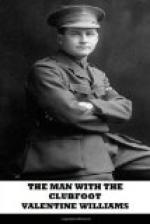I crept down the dark passage with hands outstretched. Presently they fell upon the latch of a door. I pressed it, the door opened inwards into the darkness and I passed through. As I softly closed the door behind me I heard Karl’s heavy step and the grinding of the key as he locked the area door.
I stood in a kind of cupboard in pitch darkness, hardly daring to breathe.
Once more I heard the man singing his idiotic song. I did not dare look out from my hiding-place, for his voice sounded so near that I feared he might be still in the passage.
So I stood and waited.
* * * * *
I must have stayed there for an hour in the dark. I heard the waiter coming and going in the scullery, listened to his heavy tramp, to his everlasting snatch of song, to the rattle of utensils, as he went about his work. Every minute of the time I was tortured by the apprehension that he would come to the cupboard in the passage.
It was cold in that damp subterranean place. The cupboard was roomy enough, so I thought I would put on the overcoat I was carrying. As I stretched out my arm, my hand struck hard against some kind of projecting hook in the wall behind me.
“Damn!” I swore savagely under my breath, but I put out my hand again to find out what had hurt me. My fingers encountered the cold iron of a latch. I pressed it and it gave.
A door swung open and I found myself in another little area with a flight of stone steps leading to the street.
* * * * *
I was in a narrow lane driven between the tall sides of the houses. It was a cul-de-sac. At the open end I could see the glimmer of street lamps. It had stopped raining and the air was fresh and pleasant. Carrying my bag I walked briskly down the lane and presently emerged in a quiet thoroughfare traversed by a canal—probably the street, I thought, that I had seen from the windows of my bedroom. The Hotel Sixt lay to the right of the lane: I struck out to the left and in a few minutes found myself in an open square behind the Bourse.
There I found a cab-rank with three or four cabs drawn up in line, the horses somnolent, the drivers snoring inside their vehicles. I stirred up the first and bade the driver take me to the Cafe Tarnowski.
Everyone who has been to Holland knows the Cafe Tarnowski at Rotterdam. It is an immense place with hundreds of marble-topped tables tucked away among palms under a vast glazed roof. Day or night it never closes: the waiters succeed each other in shifts: day and night the great hall resounds to the cry of orders, the patter of the waiters’ feet, the click of dominoes on the marble tables.
Delicious Dutch cafe au lait, a beefsteak and fried potatoes, most succulent of all Dutch dishes, crisp white bread, hot from the midnight baking, and appetizing Dutch butter, largely compensated for the thrills of the night. Then I sent for some more coffee, black this time, and a railway guide, and lighting a cigarette began to frame my plan of campaign.




